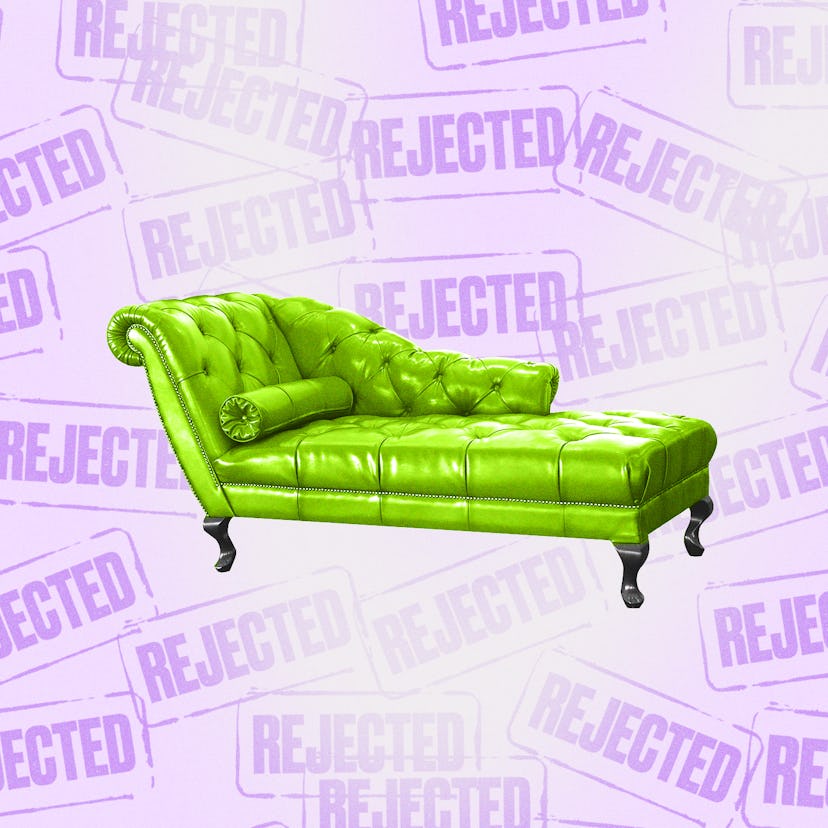
My Therapist Made Me Seek Out Dating Rejection
The tough-love fix for my struggles with shyness.
My first time with a therapist, I was 5. Since then, I’ve tried light therapy, cognitive therapy, behavioral therapy, group therapy, family therapy, couples therapy, psychopharmacology, body work, and EMDR (eye movement and desensitization and reprogramming). The best thing I’ve learned through all of this self-reflection is that change is more than possible; it’s readily attainable. Almost any problem has a solution. Things can and do get better if I’m prepared to do the work.
In my early 20s, my problem was that I was so shy, it was impossible for me to talk to women my age, which made dating an impossibility. My fear was that I’d be rejected and crumble into a million pieces.
It was the summer before I went away to graduate school. The therapist I was seeing at the time practiced CBT, or cognitive behavioral therapy, which is great for some things and less so for others. There are few more effective approaches if you’re looking to immediately change your behavior. If you’re looking for quick results, you’re in the right place. If you’re open to telling yourself a different story about who you are and you want to make changes, it’s a fantastic approach. (What cognitive therapy doesn’t do is heal the original wounds. A cognitive therapist is focused on the right now, not historical trauma.)
When I told this therapist about my struggles with shyness, she would have me provide a numerical score to the weight of my feelings. How strongly did I believe this on a scale of 1 to 10? Ten. How certain was I in the imagined outcome? Ten. She gave me homework: I was to get rejected by three different women before my next session.
“What happens if I ask someone out for coffee and she says yes?” I wondered aloud.
“Keep asking,” came the reply.
“Want to grab a coffee after the session?” I asked.
“No,” the therapist replied with a smile, and added, “That doesn’t count toward your three rejections.”
After the session, I was still afraid. I still had difficulty making eye contact. I hadn’t asked out three women in my entire life. I was awkward, lumbering, lacked fluidity, but suddenly rejection became the goal. This was an arena in which I could excel.
Over that summer, I began to believe the negative story in my head a bit less. I began to see that I could have some impact on my life. The therapist and I talked about what it meant to ask someone on a date. (This was a time when dating meant coffee, not sex.) I did my homework and went out and got rejected — a lot. The therapist was right, though: I didn’t die from shame and embarrassment. No one got angry with me for inviting them to coffee. A few weeks in, I was buying shoes from a woman my age and she was funny. I asked her out and we spent the rest of the summer together.
Suddenly rejection became the goal. This was an arena in which I could excel.
Some years later, I was with my friend Ali at a fashion show for Victoria’s Secret when I spotted one of the models who was a little shorter than the rest, closer to my height. I excused myself from the group, walked across the party, and struck up a conversation. After a few minutes, I suggested that the woman might want to go somewhere in the neighborhood with me for a quiet drink.
I wasn’t prepared for what happened next. She threw back her head and let loose a hearty belly laugh. She leaned forward and gave me a kiss on the cheek and a quick hug. “No way, bae-bae!” she said, and laughed some more. Oddly, this wasn’t humiliating at all. At first, I was perplexed, but I saw that she was so comfortable with the exchange, I found myself comfortable, too.
When I walked back to our group, Ali asked me what that conversation was about. I said I thought maybe that model might want to have a drink with me. Ali responded the same way the model had: She threw back her head in boisterous laughter. “Nice try! That’s Adriana Lima. She only dates guys named Flavio!” The rest of the group chimed in with other remarks: “Maybe you could buy her poster and hang it in your bedroom.” “Maybe if you owned a soccer team!”
Decades later, I’ve come to learn it was never about getting a date, but rather the opposite: how not to get a date. Anyone can experience success and roll with it. For me, learning to be rejected was a skill I’d use over the course of a lifetime.
This article was originally published on